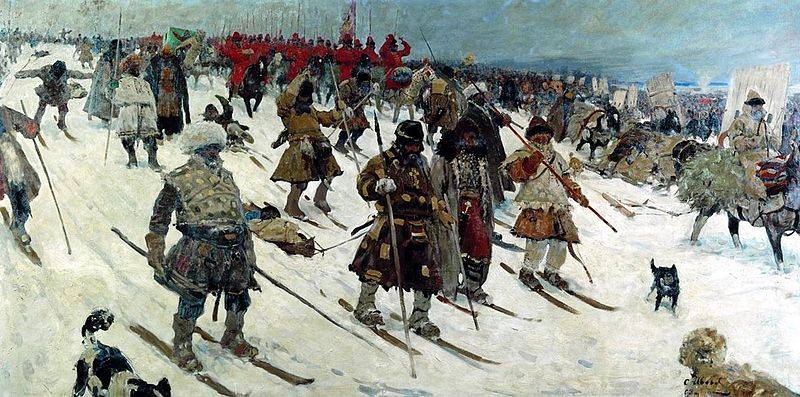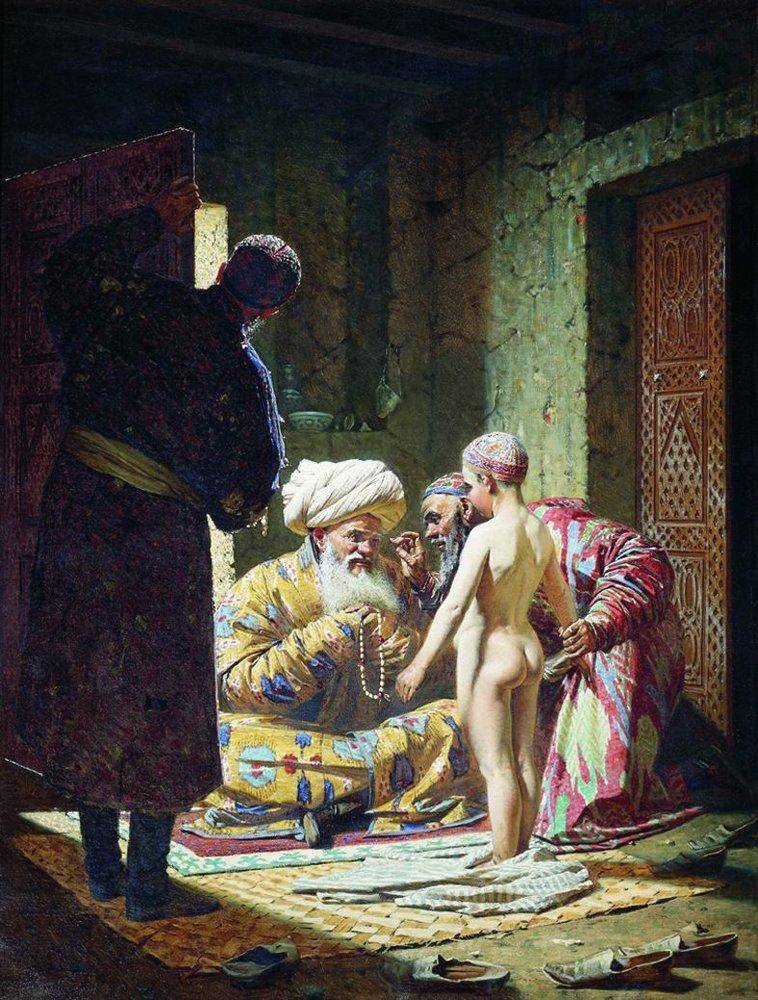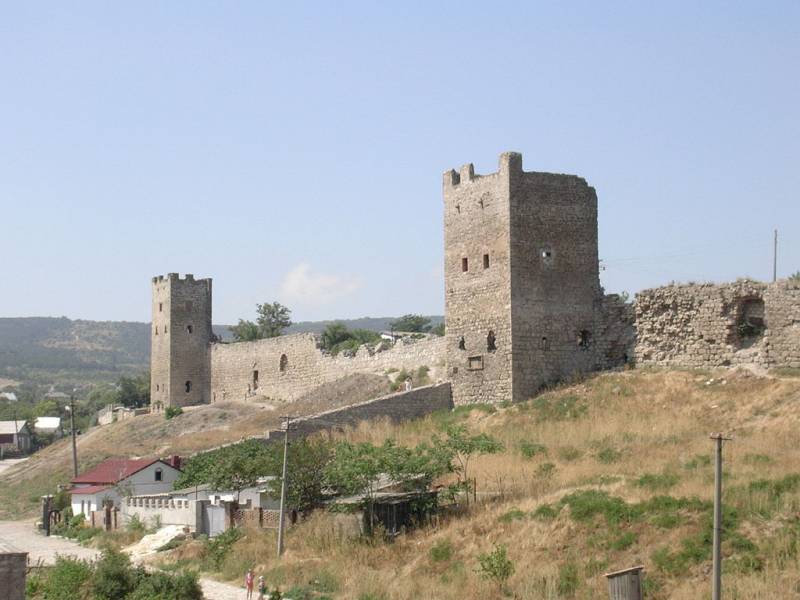The struggle of Turkey and Russia for the inheritance of the Golden Horde

Hike of the Troops of Moscow Russia, XVI century. Painting by S. Ivanov. 1903
Ottomans subjugate Crimea
The Crimean Khan Khadzhi-Girey entered into an alliance with the Turks in 1454, after the fall of Constantinople, when the Turkish fleet reached the Cafe, landed troops and tried to take the Genoese fortress. Soon the Genoese began to pay tribute to the Turks and Tatars. In 1475, the grand vizier Gedik Ahmed Pasha led a sea voyage to the Genoese colonial cities in the Crimea. In the Crimean Horde at this time there was an internecine struggle. The sons of the deceased Haji-Girey - Nur-Devlet, Mengli-Girey and Haider (Aydar) - fought for power. Large Crimean feudal lords, Genoese and the Great Horde also took part in the strife. Nur-Devlet was supported by the Big Horde, Mengli-Girey - by the Genoese. In 1475, large Crimean beys deposed Mengli-Girey and elected Haider. Mengli took refuge with the Genoese in the Cafe.
At the end of May 1475, the Ottomans, with the support of the Tatars, besieged Kafa. Mengli fought on the side of the Genoese. On June 6, the Ottomans took the fortress, executed their most active opponents and laid a huge indemnity on the rich city. The captive Mengli-Girey was sent to Istanbul. Then the Turkish army took the rest of the fortresses of the Genoese - modern Sudak, Balaklava and Inkerman. The small Orthodox principality of Theodoro was also defeated. In December, after several months of siege, the capital of the principality of Mangup fell. The Turks, enraged by heavy losses and a protracted siege, staged a massacre. Its ruler, Prince Alexander, was captured and sent to Constantinople, where they were executed. The family was also massacred. The Genoese and Christian presence in the Crimea was done away with. Ottoman garrisons were placed in the captured fortresses. The Christian population is driven out, driven into slavery and sold, or enslaved, followed by Islamization. Then the Turks captured the Taman Peninsula.
In 1478, Sultan Mehmed II freed Mengli-Girey. He was seated on the Crimean throne on the condition that Crimea accepts the supreme power of Turkey. Mengli with a detachment of janissaries arrived in Kafa, large beys went over to his side. His opponent and brothers Nur-Devlet and Haydar fled to Lithuanian Rus, and then went into the service of the Moscow Grand Duke. Nur-Devlet received the Kasimov inheritance.
The offensive on the lands of Lithuanian (Western) Rus
Since that time, Mengli-Girey has been solving two main tasks:
1) the fight against the Great Horde for hegemony in the lands of the former Golden Horde;
2) war with the Grand Duchy of Lithuania and Russia.
Moscow was a temporary ally in the war with the Great Horde and Lithuania. It was beneficial to the great Tsar Ivan III that his opponents fought on two fronts. At this time, Moscow could consistently and methodically collect Russian lands and complete the liberation from the power of the Horde, at the same time taking the path of inheritance of the Horde Empire. In 1480, standing on the Ugra River ended the era of Rus' dependence on the Horde. At this time, the Crimean horde made a campaign to Podolia, distracting the Grand Duke of Lithuania Casimir from a campaign against Moscow (he had an alliance with the khan of the Great Horde, Akhmat). At the beginning of 1481, Khan Akhmat was killed by the Tyumen khan and the Nogai. His sons began a struggle for power, and the defeat of the Great Horde was completed by the Crimean Horde.
Crimean troops led by Mengli-Girem and his sons made numerous campaigns in the lands of Lithuanian Rus. In 1482, the Crimeans took and burned Kiev, captured many prisoners. Then they annually attacked Podolia and Moldova. In 1484, the combined troops of Sultan Bayazid II and Mengli-Giray captured the most important fortress at the mouth of the Danube - Kiliya, then Akkerman (Belgorod-Dnestrovsky) - a fortress at the mouth of the Dniester. The Ottomans and Tatars took possession of the entire Black Sea coast from the mouth of the Danube to the mouth of the Dniester. Turkish garrisons were placed in all the captured cities and fortresses. In southern Bessarabia (Budzhak), the Budzhak horde was formed, subordinate to the Crimean Khan.
In 1489, the Crimean troops again devastated the Kiev and Podolsk provinces. Poland is forced to recognize the power of Turkey in the Northern Black Sea region. In 1490 the Russian and Volyn provinces were ruined. In 1494, a huge Crimean horde burned out Podolia and Volhynia. In 1495-1499. Crimean cavalry repeatedly ravaged Western Russia. In 1500, the Crimean Tatars devastated the Bratslav region, Volyn and Beresteyshchina, Belz, Lvov, Kholmsk, Lublin and Sandomierz lands. The Tatars burned Khmelnik, Kremenets, Lvov, Belz, Holm, Krasnostav, Lublin and other cities, capturing tens of thousands of people. In 1502, the Crimean hordes ravaged Galician Rus, broke into Poland, and took a huge full. In the same year, the steppe inhabitants plundered the lands of White Russia. In 1503, the Crimean troops burned down the Kiev region and Podillia, invaded Belarus, devastated the outskirts of Novogrudok and Slutsk. In 1505, a large Crimean horde invaded Belaya Rus, burned out and plundered the environs of Minsk, Slutsk, Novogrudok, Polotsk, Vitebsk and Drutsk. In the following years, invasions with the aim of robbery, robbery and the removal of people for sale into slavery continued.
Rogue Khanate
Thus, Turkey at the end of the 300th century established itself in the Northern Black Sea region. A military-robber tandem of Turkey and Crimea has been formed. The Crimean Khanate became a vassal of the Ottomans for XNUMX years. The interests of the Ottoman sultans and the Crimean khans largely coincided. Therefore, the Ottomans did not establish direct power over the Crimea, the Crimean beys and ordinary soldiers did not feel it. In reality, the leash was long, but tough. The Sultan was the caliph, the religious ruler of all Muslims. Many members of the ruling family of the Gireev lived permanently in Turkey, in Constantinople. The sultan always had Crimean princes at hand, who could at any time replace the too obstinate and objectionable khan. The Turks kept garrisons in the most important strategic fortresses and points of the Northern Black Sea region. The Ottoman fleet dominated the Black Sea.
For the khanate, Turkey was actually the only window to the world. The economy of the Crimean Khanate was completely based on the plunder of the Russian-Lithuanian lands. On the slave trade. Manufactures and crafts were poorly developed. The remnants of the Christian population, dependent peasants, were engaged in agriculture, the income from it was minimal. Nukers and nobles lived only by robbery. In close connection with traders and shipowners. Turkey was the only buyer of captives captured by the Tatars (they were previously bought by Italian merchants) and looted goods, except for the ransom for some of the Polonyans.
Also, the Port was the "roof" of the robber-parasitic Crimean formation. This firmly tied Bakhchisarai to Constantinople, much stronger than, for example, Egypt and Algeria, which were considered provinces of the Ottoman Empire. Were it not for Turkey, Russia and the Lithuanian-Polish state, singly or united, would have been able to put an end to this robber. It is possible that already in the XVI century, but not later than the XVII century. However, the powerful Turkish Empire was a reliable patron. Therefore, the Russians, Lithuanians and Poles had to limit themselves to active defense, build slashes, fortified lines, fortresses on the border, informally support the Cossacks.

Vasily Vereshchagin. Sale of a slave child. In this picture, the artist angrily denounces the dark side of Central Asian reality - the slave trade. However, it also shows well the Crimean-Turkish history
The rise of Muscovite Russia
During the disintegration of the Golden Horde in the first half of the 1437th century on the territory of the former Bulgar ulus, the former Golden Horde Khan Ulu-Muhammad proclaimed a new khanate with the capital in Kazan. The Kazan Khanate occupied the middle reaches of the Volga and almost the entire Kama basin. Moscow immediately felt the heavy hand of the new khan. In 1439, the army of Ulu-Muhammad defeated the army of Moscow governors near Belyov, in 1445 the Kazan Tatars made a campaign against Moscow, besieged the Russian capital, then Nizhny Novgorod. In the summer of 200, Ulu-Muhammad defeated the army of the Russian Tsar Vasily II near Suzdal. The Tatars captured the Grand Duke himself, took and burned Suzdal. In captivity, the frightened Vasily Vasilyevich gave a huge ransom - XNUMX thousand rubles and an inheritance on the Oka River. This is how the Tatar inheritance - the Kasimov kingdom - appeared on Russian soil in the Meshchera region. Moscow also promised the Kazan Khan to pay tribute ("exit").
Simultaneously with the process of the collapse of the Horde Empire, the appearance in its place of the Kazan, Astrakhan and Crimean khanates, the Big, Nogai and other hordes, the penetration into the Northern Black Sea coast of Turkey, the process of the rise of the Orthodox state, Muscovite Rus, was under way. Tsar Ivan III became the unifier and collector of the great power. Novgorod, the center of resistance to the Moscow princes, tried to resist, to be transferred under the rule of Lithuania. But Ivan III conquered Novgorod. The huge Novgorod land, whose possessions stretched to the north beyond the Ural stone, became part of a single state. Lost its independence and merged with Moscow Russia Great Perm, Vyatka and Tver. They retained their autonomy, but in fact Pskov and Ryazan were subordinate to Moscow.
In 1472, the Grand Duke married Sophia Palaeologus, the niece of the last Byzantine emperor, who lived in Rome after the fall of Constantinople. The idea of this marriage was vividly embraced by Pope Sixtus IV, hoping to draw Russia into the Union of Florence (the Orthodox retain their differences and autonomy, but with the recognition of the rule of the papal throne). With Sophia, a Roman legate was sent to Moscow to "show the true paths to those who are in error." But the Russian sovereign did not accept such a "dowry". The legate was quickly dismissed back. And Sophia quickly became a taste for the full-fledged ruler of Russia. So Ivan Vasilievich became related to the extinct imperial dynasty and introduced a two-headed eagle into our coat of arms - along with the previous coat of arms, which depicted St. George the Victorious, slaying the snake (Perun beating Veles). Russia becomes the heir to the Byzantine tradition, which comes from the even more ancient powers of Asia Minor.
In 1480, Moscow Russia formally became independent from the Golden Horde (de facto this happened much earlier). The Kasimov Tatars under the great Tsar Ivan III became his guard, and tribute to them began to be regarded as a salary. At the same time, not only simple warriors and Murza-beys, but also princes, legitimate contenders for the table of Kazan and Crimea, go under the arm of Moscow. Moscow is consistently adopting another great tradition - the Horde one.
For the first time, Ivan the Terrible's grandfather was able to push the border with Lithuanian Rus to the west. By the beginning of his reign, it took place near Moscow, near Mozhaisk. Lithuania was able to recapture Vyazma, Dorogobuzh, Bryansk, Kozelsk, Belev, Tarusa and two dozen other cities. Under the authority of the Moscow sovereign, the Chernigov, Seversk, Starodub and Rylsk princes passed with their estates.
To secure the eastern borders, the Grand Duke undertook several campaigns against Kazan. Simultaneously, Moscow begins to support the "pro-Russian" party in Kazan. Part of the Kazan nobility is oriented towards Moscow. The Russians actively intervene in the internal strife of the khanate, supporting Muhammad-Emin against his brother Ali-khan. In 1484, with Russian help, Tsar Ali was overthrown from the throne. However, the following year, the Eastern Party, with the help of the Nogai, overthrew Muhammad. Ali took over the throne. In 1487, Russian troops laid siege to Kazan, and the "Russian" party opened the gates. Mohammed-Emin was again elevated to the throne, he recognized himself as a vassal of Moscow. His brothers were sent to Russia, Ali died in exile in Vologda. Ivan Vasilievich took the title of Prince of Bulgaria.
To be continued ...
- Alexander Samsonov
- https://ru.wikipedia.org/

Information